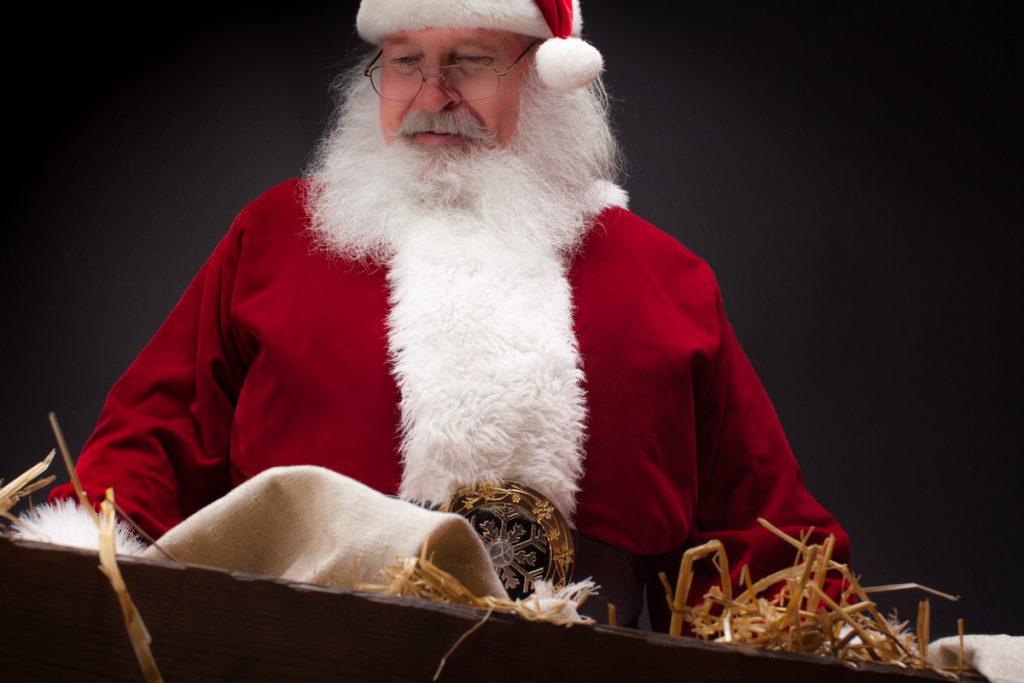Here’s how one family uses Christmas traditions to keep Christ the focal point of holiday celebrations.
Musty pine smell, glittering balls, and smooth, softly faded creche figures: Christmas packed in an old yellow trunk at the back of the children’s closet. Outside the sun is bright, the children’s voices are raised in a boisterous game of tag through the lawn sprinklers. But just smelling the pine and gently fingering the familiar plaster figure of the Christ Child awakens a sense of awe and anticipation for another season of special praise in honor of the birth of my Lord.
Waiting, hoping, eagerly looking forward, anticipating something special. When I was a child, my family didn’t focus on Christ as the center and circumference of Christmas. But there was still anticipation. Waiting for the first snow. Hoping for special presents. Eagerly looking forward to the pleased faces of my loved ones as they opened the presents I had carefully made for them. And somehow all of the waiting wasn’t over when Christmas Day had passed. It was as though all the different kinds of Christmas waiting were just shadows of the waiting that was still inside me.
When I met Jesus Christ as my Lord and Savior, I finally found out what that waiting was: I was looking for my Redeemer! The first Christmas season after I was born again was infinitely more exciting than any holiday of the past. Each kind of waiting, each part of Christmas, echoed the holy anticipation of the coming of our Lord. Now my family celebrates Christmas with our devotion centered on Jesus Christ.
Over the years we have learned and adapted many Christmas traditions that help us to focus on the birth of our Lord and Savior, sometimes even giving a Christian emphasis to the “commercialized” aspects of Christmas. We have found many ways to make Christmas a special celebration of Christ’s birthday.
SANTA CLAUS
When our oldest daughter was not quite three, we told her about a special Christian who lived a long time ago. Nicholas was the bishop of Myra in Asia Minor during the fourth century. We call him St. Nicholas because saint means someone who belongs to God, just like we do. In St. Nicholas’ town there were many poor children. They didn’t have enough food, clothes, or toys. St. Nicholas used his money to buy food, clothes, and toys for the poor children. He didn’t want them to be embarrassed by his gifts, so he gave secretly.
“St. Nicholas also told everyone about Jesus and how much God loved them. Many people became Christians because of what St. Nicholas said. Then some mean people who hated Jesus put St. Nicholas in jail to keep him from telling people about Jesus and from helping people. St. Nicholas kept on telling people about Jesus until the mean people finally had him killed.

“Because of how much St. Nicholas loved Jesus, and because of the many gifts he gave the poor children of his town, we still remember St. Nicholas at Christmas time. All of the gifts he gave, and all of the Christmas presents we give, are to remind us of the very best gift anyone ever gave: when God the Father gave His only Son, Jesus Christ, to us for our salvation.
“Today there are many people who don’t know the truth about St. Nicholas. They call him ‘Santa Claus,’ and they tell children pretend stories about him living at the North Pole and having elves and reindeer. But we know the truth, and when we see a department store Santa Claus or a picture of Santa Claus in a magazine, we remember the real Santa Claus, St. Nicholas, who loved Jesus so much and whose life and death remind us about God’s gift of Jesus Christ to us.”
By learning this true story, our children are able to enjoy Santa Claus while being reminded of the gospel and the true meaning of Christmas. We even have a small figure of Santa Claus kneeling at the manger, praying to baby Jesus, reinforcing the truth that every one, even St. Nicholas, must kneel before the King of kings and Lord of lords.
CHRISTMAS DAY
Christmas is an ancient Christian word that comes from Latin and signifies “to send Christ” or “Christ is sent”—an entirely appropriate label!
We don’t know the exact date of Christ’s birth. The early Christian Church chose December 25 as the common date upon which all Christians throughout the world would commemorate the birth of Christ. Part of the reason this date was chosen was that it was already a popular pagan holiday. Centuries ago Christian converts were under intense pressure to maintain their pagan religious ties because of cultural and social traditions. The Church understood this pressure and sought to supersede pagan traditions with ones that gave glory to the true Lord and Savior, Jesus Christ.

We tell our children, “Before Jesus was born, many people who did not know about the true God worshiped false gods, idols. They had holidays for their idols. After Jesus came, the Church wanted all Christians to have a special day to remember and celebrate Jesus’ birthday. They chose the same day as one of the pagan festivals as a way to show that Jesus Christ is the only true God and that His birthday is more important than anything having to do with an idol. Choosing that day for Christmas is sort of like a picture of how God deals with people. When people don’t believe in God, they are like the pagans and nothing they do pleases God. When they become Christians and love Jesus, the Holy Spirit transforms them into people who please God.”
We anticipate Christmas long before December 25. Our church has special “advent” (Christ’s coming) services each Wednesday for four weeks before Christmas. These special services ready our hearts for Christmas and turn our eyes away from crass commercialization and hectic holiday schedules and toward the coming of our Savior, Jesus Christ. Sometimes we get so busy we are tempted to skip a week; but, as our pastor reminds us, if we spent as much time preparing our hearts for Christmas as we did our homes, we would be in great shape spiritually!
CHRISTMAS PRESENTS
At our house, we begin anticipating Christmas in October, when we buy inexpensive pumpkins, bake them, and use the pulp for pumpkin bread, which we freeze for Christmas presents. We have a good family time mixing, measuring, cooking, and talking about the special friends who will receive our gifts. We start looking forward to Jesus’ birthday, when God sent His only Son to us as the best present of all. Our pumpkin bread represents our love for our friends, but most important, it should represent God’s gift to us in Jesus Christ.
Our family keeps gift-giving to a minimum of special, meaningful gifts. Each gift, eagerly anticipated by our children, is another reminder of the One Gift.

Each member of our family prepares a special gift for Jesus each year. Weeks of discussion, prayer, and thought go into selecting a promise for the next year that will please Jesus. It may take a positive form (“My gift to Jesus is to promise to spend more time playing with my little brother”), or a negative form (“My gift to Jesus is to promise not to call my sister names anymore”). The promise is printed on a card and decorated for Jesus. On Christmas morning we have a birthday cake for Jesus, sing “Happy Birthday” to Jesus, share our Jesus presents with each other, and pray as a family that we will be able to fulfill our promises.
The repetition, the anticipation, the repeated telling of the gospel in different ways through presents, traditions, and family times, combine as a powerful reinforcement of Christian truth. Although Christmas has been secularized and commercialized by many people, Christians can use Christmas as a vehicle for the gospel. Let us approach this Christmas echoing the glory expressed by the angel: “‘Do not be afraid. I bring you good news of great joy that will be for all the people. Today in the town of David a Savior has been born to you; he is Christ the Lord'” (Lk. 2:10-11).
For Further Reading
- For adults: Clement A. Miles, Christmas Customs and Traditions
- For children: Harold Myra, Santa, Are You for Real?
Gretchen Passantino Coburn is the co-founder & director of one of the oldest & best-known Christian apologetics & research organizations in the world, Answers In Action (AIA). She has been in full-time Christian ministry for 40 years & is a well-respected & award-winning teacher, author, qualified expert, & speaker.

